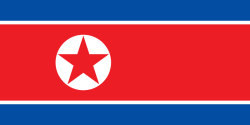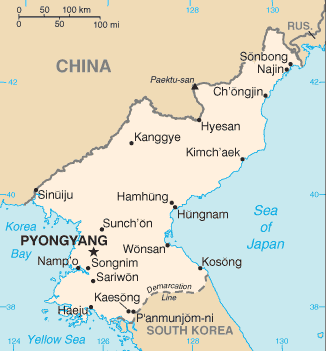North Korea
Related Categories:
 Flag of North Korea
Flag of North KoreaThree horizontal bands of blue (top), red (triple width), and blue; the red band is edged in white; on the hoist side of the red band is a white disk with a red five-pointed star. |
 North Korea - Fotw
North Korea - FotwWhite has been the traditional colour of the Korean nation and figures in the flag of North Korea as a symbol of purity, strength and dignity.
www.fotw.us/
North Korea is officially described as a Juche (self-reliance) State. Government is organized as a dictatorship. Kim Il-sung, the founder of North Korea, was the country's first and only president.
en.wikipedia.org/
Introduction
About
Contact
Symbols in The News
Interpret this Symbol
AAC
African
AI
Alchemy
Alphabets
Ancient
Animal Symbolism
Architecture
Art
Articles
Astrology
Baha'i
Blissymbolics
Blueprint Symbols
Buddhist
Celtic Symbols
Cemetery
Chinese Symbols
Christian
Circle
City
Codes
Color
Conlangs
Crop Circles
Danger
Da Vinci Code
Designing Logos
Dictionaries
Dreams
Education
Egyptian Symbols
Electrical
Emoticons
Find Images
Fonts
Food
Fraternity
Hamsa
Healing
Heraldry
Hermetic
Highway Signs
Hindu
History
Hobo
Holiday
Icons
iConji
Islamic
Jain Symbols
Japanese, Kanji
Jewish
Justice
Law
Literary Symbolism
Mandalas
Map
Masonic
Math, Number
Meaning of Names
Medical
Middle East
Military
Miscellaneous
Money
Music
Mythology
Native American
Playing Cards
Power
Psychology
QiQiiKhu
Reiki
Religious
Runes, Norse
Sacred Geometry
Scientific
Science Fiction
Sorority
Sports
Symbols in the News
Tattoos
ThirteenSymbols
Tree of Life
Ursprache
Videos
Visual Languages
Weather
Web Codes
Wicca
Words
Writing Systems
Braille
Coinherence
Coptic
Cuneiform
Easter Island
Etruscan
Happy Human
Hebrew
Kokopelli
Linear B
Lotus
Love Symbols
Mandorla
Moon Alphabet
Nine Pointed Star
Om
Oz
Phonetic
Scarab Beetle
Silent
Theosophy
Unifon
About
Contact
Symbols in The News
Interpret this Symbol
AAC
African
AI
Alchemy
Alphabets
Ancient
Animal Symbolism
Architecture
Art
Articles
Astrology
Baha'i
Blissymbolics
Blueprint Symbols
Buddhist
Celtic Symbols
Cemetery
Chinese Symbols
Christian
Circle
City
Codes
Color
Conlangs
Crop Circles
Danger
Da Vinci Code
Designing Logos
Dictionaries
Dreams
Education
Egyptian Symbols
Electrical
Emoticons
Find Images
Fonts
Food
Fraternity
Hamsa
Healing
Heraldry
Hermetic
Highway Signs
Hindu
History
Hobo
Holiday
Icons
iConji
Islamic
Jain Symbols
Japanese, Kanji
Jewish
Justice
Law
Literary Symbolism
Mandalas
Map
Masonic
Math, Number
Meaning of Names
Medical
Middle East
Military
Miscellaneous
Money
Music
Mythology
Native American
Playing Cards
Power
Psychology
QiQiiKhu
Reiki
Religious
Runes, Norse
Sacred Geometry
Scientific
Science Fiction
Sorority
Sports
Symbols in the News
Tattoos
ThirteenSymbols
Tree of Life
Ursprache
Videos
Visual Languages
Weather
Web Codes
Wicca
Words
Writing Systems
Braille
Coinherence
Coptic
Cuneiform
Easter Island
Etruscan
Happy Human
Hebrew
Kokopelli
Linear B
Lotus
Love Symbols
Mandorla
Moon Alphabet
Nine Pointed Star
Om
Oz
Phonetic
Scarab Beetle
Silent
Theosophy
Unifon
